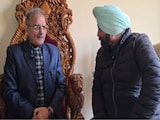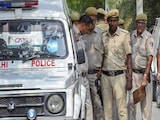2022 began on a note of optimism after two years of disruption due to the Covid pandemic. With most parts of the world easing curbs, sports and public events took centrestage again and tourism received a boost as people took off to put the tough time behind them. The year, however, was not without its difficulties. The Ukraine war threatened world peace, global inflation hit family budgets and the climate change challenge only grew taller. As 2022 draws to an end, a fresh surge in Covid cases in China has brought back grim memories, and the world has its fingers crossed for 2023.
The Ukraine War: The Russian invasion of Ukraine started in February after President Vladimir Putin accused Ukraine of being an "anti-Russia" state and alleged that the US-led NATO is expanding to the east and this is a threat to the borders of Russia. Over 300 days on, the war is still on, with Ukraine putting up a spirited resistance to the Russian offensive.
Imran Khan's Ouster: In April, Imran Khan was ousted as Pakistan Prime Minister, becoming the country's first Prime Minister to lose power by a no-confidence vote. The vote saw high drama, with Mr Khan's attempt to dissolve the national Assembly prompting an intervention by the Supreme Court. Shehbaz Sharif, brother of former Pakistan prime minister Nawaz Sharif, succeeded Mr Khan.
Sri Lanka Economic Crisis: As the island nation reeled under the worst economic crisis in its history, the people took to the streets. The protests intensified around March-end and peaked in May, when Mahinda Rajapaksa was forced to resign as Prime Minister. Gotabaya Rajapaksa, who refused to resign as president, was forced to flee the country as the agitation grew. He was eventually forced to quit, becoming the first Lankan President to do so mid-term. Ranil Wickeremesinghe was elected by the Lankan parliament for the remainder of Mr Rajapaksa's term.
Assassination of Shinzo Abe: Shinzo Abe, Japan's former Prime Minister, was assassinated on July 8 while he was addressing an outdoor political gathering. The man accused of shooting him told investigators that he targeted Mr Abe because he had allegedly promoted a religious group. The alleged shooter said he was upset because the group, called Unification Church, had bankrupted his mother.
Droupadi Murmu Is President: Droupadi Murmu was sworn in as India's 15th President on July 25, becoming the country's first tribal to hold the highest constitutional office. She is also the second woman after Pratibha Patil to occupy the post. A former teacher, President Murmu has earlier served as the Governor of Jharkhand and minister in Odisha, her home state.
European Heatwave: Never before temperatures of over 40 degrees Celsius were reported in France, Germany, Spain and the UK as a heatwave swept across Europe, leading to health issues for the people and severe droughts. Climate scientists said such temperatures were "virtually impossible" without climate change, news agency Reuters reported. The heatwaves may have led to more than 20,000 excess deaths in the continent, said Reuters, quoting a report compiling official figures.
Attack on Salman Rushdie: Author Salman Rushdie, who has been the target of radical forces for his writings, was attacked at an event in New York on August 12. The attacker, Hadi Matar, stabbed him in the neck and abdomen. Matar later said in an interview to New York Post that he had acted alone. He described Mr Rushdie as "disingenuous". "I don't like him. He's someone who attacked Islam, he attacked their beliefs, the belief systems," The Post report said quoted him as saying.
Queen Elizabeth Dies: Queen Elizabeth II died on September 8, bringing an end to the longest reign by any British monarch. She was 96. The 70-year reign of Queen Elizabeth, the longest verified by any female monarch in history, was witness to major world events such as the landing on the moon and the fall of the Berlin Wall, as well as some of the biggest royal scandals. Queen Elizabeth was succeeded by her 74-year-old son Charles as King.
Xi Jinping's Historic Third Term: Chinese President Xi Jinping secured a third term as the leader of the Chinese Communist Party this October, becoming only the second leader to do so after Mao Zedong, the founder of the People's Republic. XI's third term as General Secretary of the party, which cemented his iron grip on power, started with the introduction of a new governing body packed with his loyalists. Xi's term as the leader of China has witnessed heightened censorship and more state control over the economy. He now faces tall challenges in the form of an economic slowdown, alienation from the West owing to China's growing closeness to Russia and the tussle over Taiwan.
Rishi Sunak Is UK Prime Minister: On October 25, Rishi Sunak was sworn in as Britain's first Prime Minister of colour, six weeks after he had lost to Liz Truss in the race for the top post. Indian-origin Mr Sunak bounced back when Ms Truss stepped down amid the UK's deepening economic crisis. For India, Sunak's entry to 10 Downing Street was immensely symbolic owing to India's history of colonial oppression. The 43-year-old Conservative leader is known to speak proudly of his Indian connection. This has endeared him to Indians, who hope his elevation would be good for the country's ties with the UK.
Elon Musk's Twitter Takeover: Tesla CEO and billionaire Elon Musk concluded his acquisition of the microblogging site this October after months of dramatic developments. Twitter, which Mr Musk has earlier described as the world's "de facto public town square" has seen sweeping changes since, including mass layoffs and reinstatement of suspended accounts. Mr Musk has maintained that he is a free speech absolutist and opposed the earlier enforcement strategies used by Twitter. He has also dismissed reports claiming an uptick in hate speech on the platform since he took over. His radical moves, including a fee for a verified badge and polls on key issues, effectively represent a reset of social media that is increasingly shaping global thought processes.
Gujarat Bridge Tragedy: At least 135 people, including over 50 children, died when a suspension bridge across Machchhu river collapsed on October 30. The incident, now among the worst bridge collapse tragedies ever, took place days after the 143-year-old bridge was reopened following a long closure for repairs. A probe into the incident revealed huge lapses in the renovation and management of the bridge after it was reopened. Questions were raised on why Oreva Group, known for manufacturing watches and fans, was entrusted the task of revamping the suspension bridge. Nine people, all associated with Oreva, have been arrested since.
Iran Protests: Iran is witnessing widespread protests against the country's strict hijab dress code for women. The protests, which started in September against an economic crisis and curbs on free speech, intensified after 22-year-old Mahsa Amini died in custody following her arrest on charges of not wearing the hijab improperly. While government authorities claimed she died of a heart attack, her family alleged that she was tortured by Iran's "morality police". In massive protests, women burned hijabs and chopped off their hair. Iran's government described the demonstrations as "riots" and cracked down, sentencing several protesters to death.
Argentina Wins World Cup: Argentina defeated France on December 18 to clinch the FIFA World Cup glory 26 years after football legend Diego Maradona led the country to the football world's biggest trophy. This time, it was Lionel Messi, who led Argentina to victory as captain, immortalising a legacy comparable only to his compatriot Maradona and Brazil's Pele. But the road was not easy. Stunning equalisers by France's Kylian Mbappe took the match to the penalty shootout stage, turning it into a nail-biter that many have claimed was the best FIFA World Cup final ever.
Covid Spike Concerns: As the year draws to a close, reports of a massive spike in Covid cases in China have brought back grim memories of the devastation the pandemic caused in India. Concerns of another wave have prompted authorities to reassess the readiness of the health infrastructure if cases rise. So a year that started with optimism is ending on a note of caution. Authorities, however, have stressed that there is no cause for alarm, citing widespread vaccination coverage and natural immunity due to multiple waves of infections.















